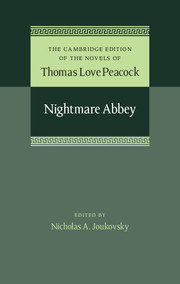Book contents
- Frontmatter
- Contents
- List of Illustrations
- General Editor’s Preface
- Acknowledgements
- Chronology
- List of Abbreviations
- Introduction
- Nightmare Abbey
- Appendix A Peacock’s Preface of 1837
- Appendix B An Essay on Fashionable Literature (1818)
- Appendix C The Four Ages of Poetry (1820)
- Note on the Text
- Emendations and Variants
- Ambiguous Line-End Hyphenations
- Explanatory Notes
- Select Bibliography
Appendix A - Peacock’s Preface of 1837
Published online by Cambridge University Press: 30 June 2022
- Frontmatter
- Contents
- List of Illustrations
- General Editor’s Preface
- Acknowledgements
- Chronology
- List of Abbreviations
- Introduction
- Nightmare Abbey
- Appendix A Peacock’s Preface of 1837
- Appendix B An Essay on Fashionable Literature (1818)
- Appendix C The Four Ages of Poetry (1820)
- Note on the Text
- Emendations and Variants
- Ambiguous Line-End Hyphenations
- Explanatory Notes
- Select Bibliography
Summary
PREFACE TO THE VOLUME OF “STANDARD NOVELS” CONTAINING “HEADLONG HALL,” “NIGHTMARE ABBEY,” “MAID MARIAN,” and “CROTCHET CASTLE.”
ALL these little publications appeared originally without prefaces. I left them to speak for themselves; and I thought I might very fitly preserve my own impersonality, having never intruded on the personality of others, nor taken any liberties but with public conduct and public opinions. But an old friend assures me, that to publish a book without a preface is like entering a drawing-room without making a bow. In deference to this opinion, though I am not quite clear of its soundness, I make my prefatory bow at this eleventh hour.
“Headlong Hall” was written in 1815; “Nightmare Abbey,” in 1817; “Maid Marian,” with the exception of the last three chapters, in 1818; “Crotchet Castle,” in 1830. I am desirous to note the intervals, because, at each of those periods, things were true, in great matters and in small, which are true no longer. “Headlong Hall” begins with the Holyhead Mail, and “Crotchet Castle” ends with a rotten borough. The Holyhead mail no longer keeps the same hours, nor stops at theCapel Cerig Inn, which the progress of improvement has thrown out of the road; and the rotten boroughs of 1830 have ceased to exist, though there are some very pretty pocket properties, which are their worthy successors. But the classes of tastes, feelings, and opinions, which are successively brought into play in these little tales, remain substantially the same. Perfectibilians, deteriorationists, statu-quo-ites, phrenologists, transcendentalists, political economists, theorists in all sciences, projectors in all arts, morbid visionaries, romantic enthusiasts, lovers of music, lovers of the picturesque, and lovers of good dinners, march, and will march for ever, pari passu with the march of mechanics, which some facetiously call the march of intellect. The fastidious in old wine are a race that does not decay. Literary violators of the confidences of private life still gain a disreputable livelihood and an unenviable notoriety.
- Type
- Chapter
- Information
- Nightmare Abbey , pp. 103 - 105Publisher: Cambridge University PressPrint publication year: 2016

